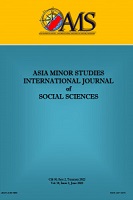Osmanlı Devleti’nde Sürgün: Arvad Adası Örneği (18. Yüzyıl)
Exile in the Ottoman Empire: A Paradigm of Arwad/ the classical Aradus or Ruad Island (The 18th Century)
Author(s): Mustafa KoyuncuSubject(s): Political history, Social history, Social Theory, 18th Century, The Ottoman Empire, Sociology of Politics
Published by: Kilis 7 Aralık Üniversity
Keywords: Arwad Island; Exile; Kalebend; Cezirebend;
Summary/Abstract: The Notion of „Exile‟ is of vital importance the period from the Ottoman Empire onwards. Sending into exiles is carried out mostly for residential purposes in the beginning, however in the following years, punishment has a critical point in the exile implementations. The Ottoman Empire aims to ensure public safety and to make economic and social life more efficient with this punishment method. The method of exile stands out as a type of punishment that has been used very frequently, especially since the 18th century. The state enforces exiles to various islands. Arwad Island, Lesbos, Limnos and Bozcaada are some of these exile regions. Among the reasons why the criminals are exiled to the islands is the fact that the islands are surrounded by seas on all four sides and there is slight possibility of an escape from these places. The person who is exiled to the Arwad Island, the only island of Syria used as a settlement due to of many kinds of crimes, is sentenced to life imprisonment such as kalebend or cezirebend. The Ottoman Empire takes the demands and complaints of the exiled into account from the moment they are sentenced, and allowed them to be released with amnesty, sometimes with general amnesties, and sometimes on excuses.
Journal: Asia Minor Studies
- Issue Year: 2022
- Issue No: 2
- Page Range: 141-152
- Page Count: 11
- Language: Turkish

